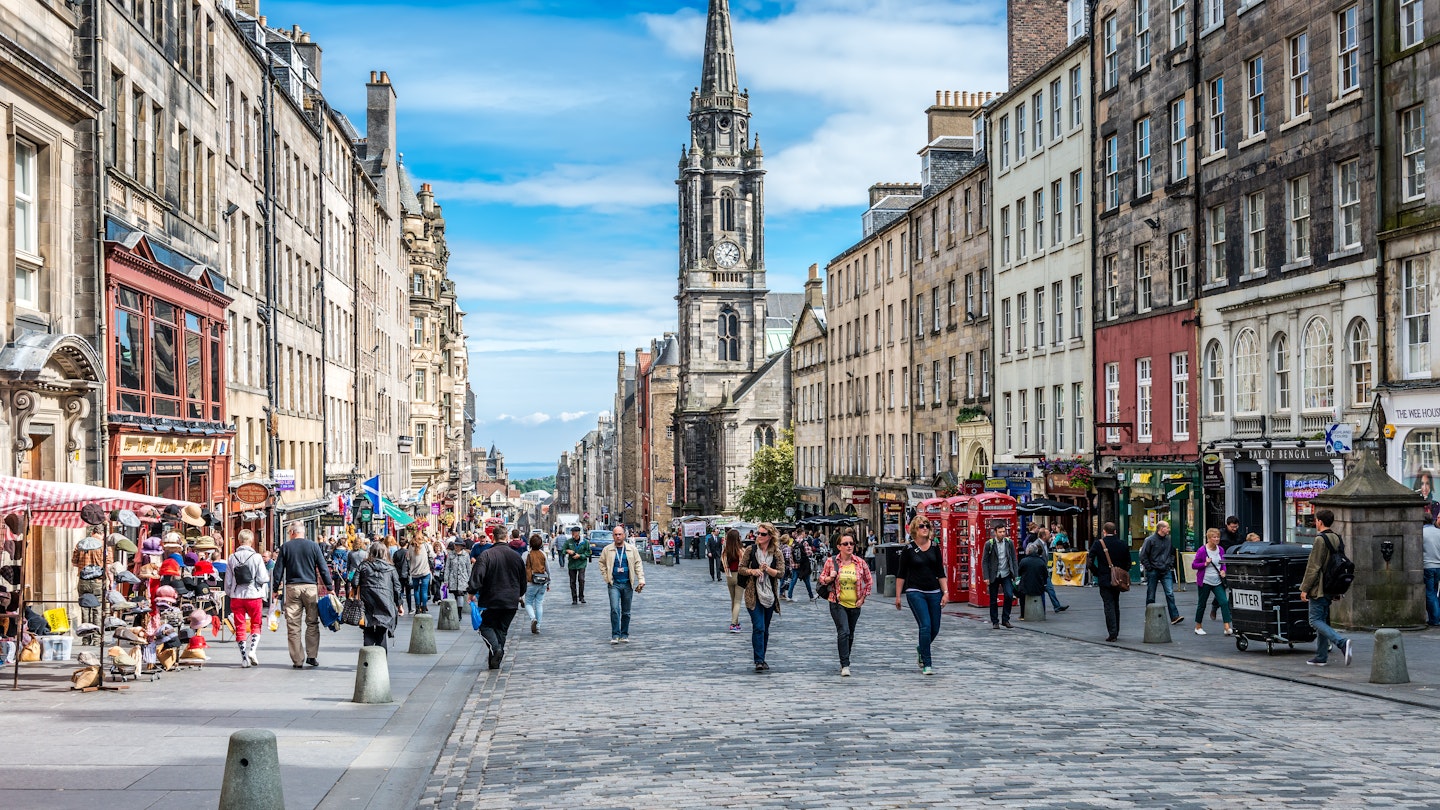With its grand castle and famous festival, Edinburgh is a tourist magnet. However, Scotland’s capital isn’t just a collection of big-ticket sights. Set on a series of extinct volcanoes and blessed with chasm-like medieval alleys and grand civic squares, Edinburgh is a stunning city rich in culture.
There’s history around every sandstone-hewn corner, of course, but visitors will also find vibrant life in its parks, pubs, and suburbs. Edinburgh isn’t just worth visiting; it’s worth diving into. Here’s what you need to know before you arrive: when to go, what to pack, and much more.
Planning Your Trip to Edinburgh
1. Arriving in Edinburgh
Edinburgh’s airport is 8 miles (13 km) away. Buses (more economical), trams (faster during peak hours), and taxis (ideal for door-to-door service) connect the terminal with the city center.
Train passengers arrive at Edinburgh Waverley, enjoying gorgeous coastal views along the journey. Buses come into St Andrew’s Square in the New Town, just north of the central attractions.
2. Visit in Summer for Better Weather
Summer, characterized by long, bright days and milder winds, is ideal for many visitors. Nonetheless, if a bit of dreich (dismal) weather doesn’t deter you, consider a visit in the colder months, perfectly mixing warm pubs with invigorating strolls through atmospheric streets.
3. Consider the Festival Timing
Every August, the Edinburgh International Festival, the world’s largest arts festival, takes over the city. If you plan to attend, ensure you arrange your accommodations months in advance and secure tickets for major shows. If not attending the festival, try to avoid visiting in August when the city becomes particularly crowded.
4. Advantages of Booking in Advance
Booking accommodations early pays off, especially during festival periods. Major events should be reserved well ahead. Consider the Edinburgh City Pass for access to popular attractions, allowing for a budget-friendly experience. Booking online for the castle can save both time and money.
5. Waterproof Gear is Essential
Bringing a waterproof jacket is advisable as the weather can change rapidly from clear skies to heavy rain. With a lot of walking involved, packing comfortable shoes is also crucial; formal attire is typically unnecessary.
6. Understanding the Two Towns
Central Edinburgh is divided, not by rivalry, but by the valley containing the elegant Princes Street Gardens and Waverly Station. The Old Town is steeped in medieval charm, while the New Town offers a more structured layout with airy boulevards.
7. How Long to Spend in Edinburgh
A day allows for a brief tour of the Royal Mile and some exploration around the Castle. A duration of two days provides a better understanding of what both towns offer. Stays of four days or more will reveal deeper insights, including trips to attractions in Leith and beyond.
Experiencing Edinburgh
8. Currency Information
Scotland has its own banknotes, but English currency is widely accepted. Contactless payments are becoming increasingly common, especially for public transport, where cash usage may require exact change.
9. LGBTQ+ Scene in the Pink Triangle
Edinburgh’s vibrant gay community is found in the “Pink Triangle,” situated northeast of Princes Street, featuring notable venues like CC Blooms, which offers food and nighttime entertainment.
10. The Origins of Old Reekie
Nicknamed “Old Reekie,” Edinburgh’s moniker dates back to the 17th century, reflecting the city’s history of odors due to narrow, tall streets and stagnant water sources. Modern Edinburgh resembles many urban areas regarding scent.
11. Navigating Edinburgh
While Edinburgh’s terrain is hilly, walking is the best way to explore, offering unexpected views and insights into the city’s culture. For longer distances, taxis or rides from popular apps like Uber are available; trams and buses also connect key areas, including Leith and the Southside.
Local Etiquette in Edinburgh
12. Mind Your Manners
Socially, a friendly “hi” or handshake is the norm when meeting others. Topics like politics and religion are often avoided during small talk, especially given their potential to spark passionate discussions.
13. Understanding Local Lingo
Edinburgh is home to a fascinating assortment of accents and local terms. Recognizing unique expressions can enhance your experience—terms like haar (sea fog) and Jambos (supporters of Hearts) are common but may need explanation for outsiders.
14. Pub Culture
In public houses, one person typically orders for the group and pays for the “round” of drinks, returning to the table with them. Most establishments accept both cash and card payments, with later closing hours compared to southern Britain.
15. Tipping Norms
Tipping is customary for table service in restaurants, ranging from 10% to 15%. Locals often round up taxi fares or tip hotel porters for assistance with luggage.
Health and Safety in Edinburgh
16. General Safety Observations
Edinburgh is relatively safe, particularly in lively areas like Cowgate and Lothian Road during weekends. While serious crime is rare, it’s wise to take typical safety precautions, especially at night.
17. Accessibility Information
Most modern attractions are accessible for travelers with disabilities, though many older buildings lack necessary accommodations. New Town streets are generally easier to navigate than the steep and cobbled Old Town.
18. Drinking Water Quality
Edinburgh’s tap water is safe to drink, often available for free in restaurants. The region’s water is notably soft, providing a fresher taste than most of the UK.




